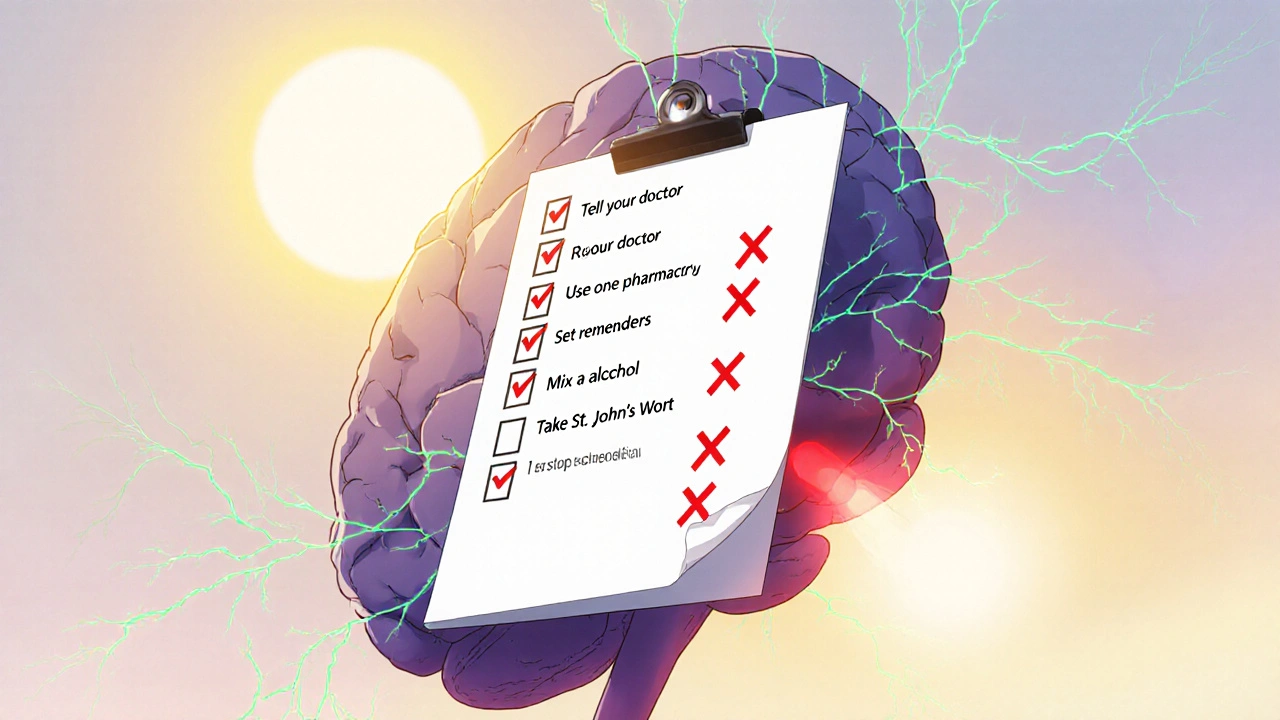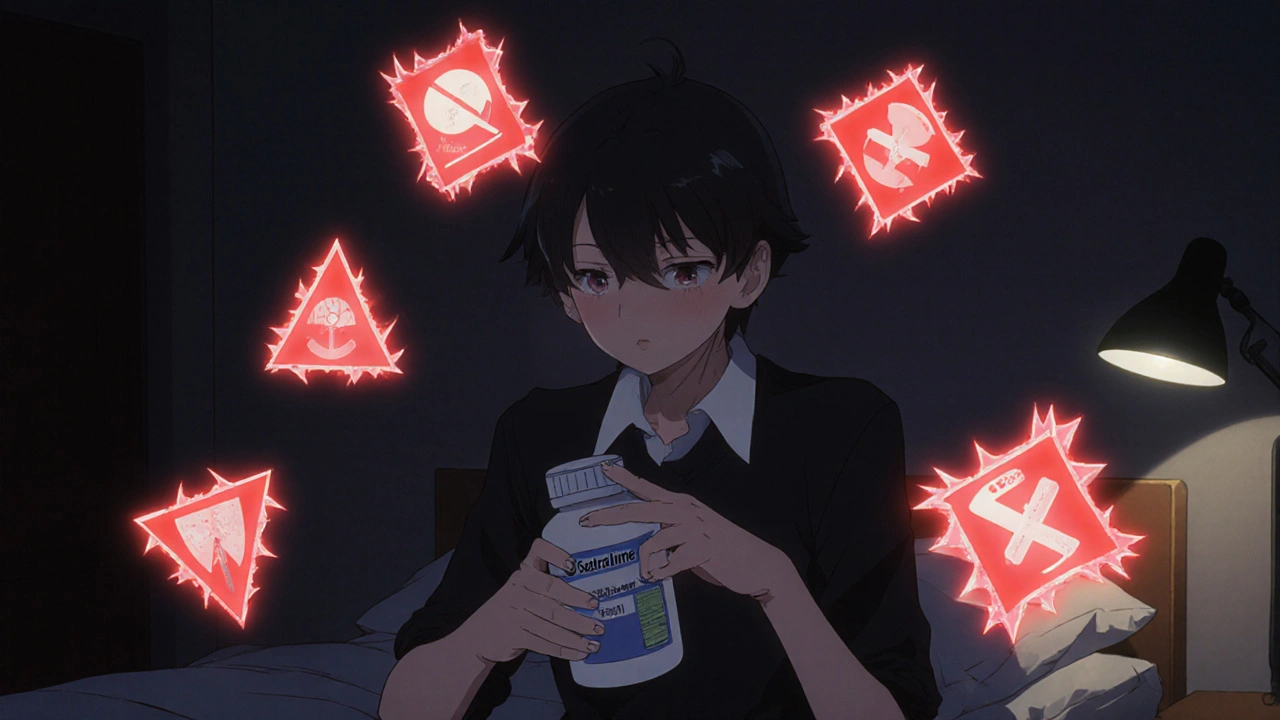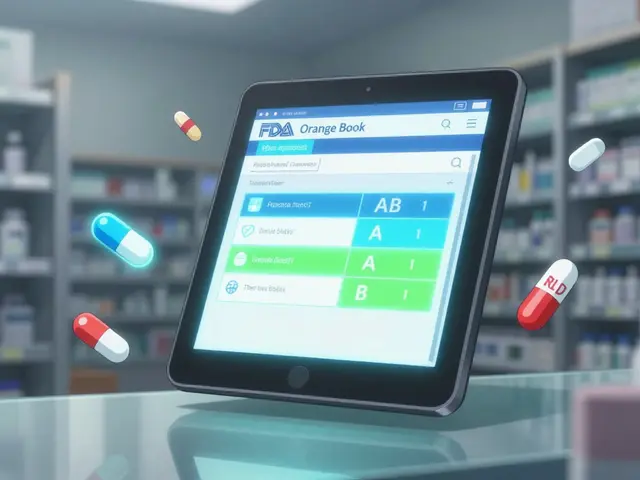When you're taking sertraline, even small changes in your medication routine can have big consequences. Sertraline is a common antidepressant, often prescribed for depression, anxiety, and OCD. But it doesn’t play well with everything. Mixing it with the wrong drug, supplement, or even a glass of wine can lead to serious side effects - some of them life-threatening. You don’t need to panic, but you do need to know what to watch for.
What Makes Sertraline Risky With Other Drugs?
Sertraline works by increasing serotonin in your brain. That’s how it helps lift mood and reduce anxiety. But too much serotonin can cause something called serotonin syndrome. It’s rare, but it’s dangerous. Symptoms include rapid heartbeat, high blood pressure, fever, shaking, confusion, and muscle rigidity. In severe cases, it can lead to seizures or death.
That’s why combining sertraline with other serotonin-boosting drugs is risky. It’s not just about prescription meds. Even over-the-counter supplements and herbal remedies can push your serotonin levels too high.
Medications That Can Cause Dangerous Interactions
Here are the top categories of drugs you should avoid or use with extreme caution while taking sertraline.
1. Other Antidepressants
Don’t mix sertraline with other SSRIs like fluoxetine or escitalopram. Even SNRIs like venlafaxine or duloxetine can increase your risk of serotonin syndrome. Monoamine oxidase inhibitors (MAOIs) like phenelzine or selegiline are especially dangerous. You must wait at least 14 days after stopping an MAOI before starting sertraline - and vice versa.
There’s no safe way to stack these drugs. If your doctor wants to switch you from one antidepressant to another, they’ll give you a clear washout period. Never do it yourself.
2. Painkillers and Anti-Inflammatories
NSAIDs like ibuprofen, naproxen, and diclofenac can increase your risk of bleeding when taken with sertraline. Sertraline affects platelets, making your blood less likely to clot. Add NSAIDs to the mix, and you’re looking at a higher chance of stomach ulcers, nosebleeds, or even internal bleeding.
Even acetaminophen (paracetamol) isn’t completely risk-free. While it doesn’t affect clotting like NSAIDs, long-term use with sertraline can stress your liver. If you’re on both, keep your alcohol intake low and get regular liver checks.
3. Blood Thinners
Warfarin, apixaban, rivaroxaban - these are all blood thinners. When taken with sertraline, they can make bleeding more likely. You might notice bruising more easily, or bleeding that won’t stop after a cut. If you’re on warfarin, your doctor will need to monitor your INR levels more often. Any change in your sertraline dose could throw off your blood clotting time.
4. Triptans for Migraines
Drugs like sumatriptan or rizatriptan are used to treat migraines. They also affect serotonin. Combining them with sertraline can trigger serotonin syndrome, especially if you take them frequently. If you get migraines and are on sertraline, talk to your doctor about alternatives like acetaminophen or preventive treatments that don’t raise serotonin.
5. St. John’s Wort and Other Herbal Supplements
St. John’s Wort is a popular natural remedy for mild depression. But it’s a serotonin booster too. Taking it with sertraline is like double-dosing on antidepressants. There are documented cases of serotonin syndrome from this combo.
Other supplements to avoid: tryptophan, 5-HTP, SAMe, and even some energy drinks with high doses of L-tryptophan or B vitamins that affect serotonin pathways. Always tell your doctor what supplements you’re taking - even if you think they’re "natural" and "safe."
Alcohol and Sertraline: A Risky Mix
You might think a glass of wine won’t hurt. But alcohol makes sertraline’s side effects worse. Drowsiness, dizziness, poor coordination - all get amplified. You’re more likely to fall, drive dangerously, or make poor decisions.
Alcohol also depresses your mood. If you’re taking sertraline for depression, drinking can undo its benefits. It’s not just about immediate effects. Long-term drinking with sertraline can lead to worse anxiety, sleep problems, and even liver damage.
Most doctors recommend avoiding alcohol completely while on sertraline. If you do drink, limit it to one drink occasionally - and only after talking to your prescriber.

Other Drugs to Watch Out For
Some less obvious drugs can also interact:
- Linezolid - an antibiotic that acts like an MAOI. Never take it with sertraline.
- Methadone - can increase sertraline levels and raise the risk of heart rhythm problems.
- Phenytoin - an anti-seizure drug that can lower sertraline’s effectiveness.
- Buspirone - an anti-anxiety med that can add to serotonin effects.
- Tramadol - a painkiller that also affects serotonin. Risk of seizures and serotonin syndrome is real.
If you’re prescribed any new medication - even something for a cold or a rash - always check with your pharmacist or doctor first. Don’t assume it’s safe just because it’s not a psychiatric drug.
What to Do If You’re Already Taking These Drugs
Don’t stop sertraline suddenly. That can cause withdrawal symptoms like dizziness, nausea, irritability, and electric-shock sensations. If you need to change your meds, your doctor will guide you through a slow taper.
If you’re currently on any of the drugs listed above and want to start sertraline, your doctor may:
- Switch you off the other drug first, with a washout period
- Lower your sertraline dose to start
- Monitor you closely for the first few weeks
- Order blood tests to check liver function or drug levels
Keep a list of every medication and supplement you take. Bring it to every appointment. Use a pill organizer with clear labels. Set phone reminders if you’re on multiple drugs.
Signs You Might Be Having an Interaction
Watch for these red flags, especially in the first few weeks after starting sertraline or adding a new drug:
- Unexplained fever or sweating
- Rapid heartbeat or high blood pressure
- Muscle stiffness or twitching
- Confusion, agitation, or hallucinations
- Diarrhea or vomiting that won’t stop
- Unusual bleeding - nosebleeds, gum bleeding, dark stools
If you experience any of these, stop taking the new drug and call your doctor immediately. In an emergency, go to the nearest hospital. Serotonin syndrome can escalate quickly.

How to Stay Safe Long-Term
Here’s a simple checklist to keep your sertraline treatment safe:
- Never start, stop, or change a dose without talking to your prescriber
- Always tell every new doctor you see that you’re on sertraline
- Keep a current list of all meds and supplements - including vitamins and herbs
- Use one pharmacy for all your prescriptions so they can check for interactions
- Set reminders to review your meds every 3 months with your doctor
- Watch for new symptoms - especially in the first 4 weeks after any change
If you’re unsure about a new medication, ask your pharmacist: "Is this safe with sertraline?" They’re trained to catch these interactions. Don’t be shy - it’s their job.
When to Call Your Doctor Right Away
You don’t need to wait for a scheduled appointment if something feels off. Call your doctor immediately if:
- You start feeling unusually anxious, agitated, or suicidal
- You notice unusual bleeding or bruising
- You develop a high fever with muscle stiffness
- You feel your heart racing for no reason
- You start having seizures or lose consciousness
These aren’t normal side effects. They’re warning signs. Quick action can prevent serious harm.
Can I take ibuprofen with sertraline?
You can take ibuprofen occasionally for a headache or muscle pain, but not regularly. Both sertraline and ibuprofen increase bleeding risk. Long-term use can lead to stomach ulcers or internal bleeding. If you need daily pain relief, ask your doctor about acetaminophen instead - but even that should be used carefully if you drink alcohol or have liver issues.
Is it safe to drink alcohol while on sertraline?
It’s not recommended. Alcohol makes sertraline’s side effects worse - drowsiness, dizziness, poor judgment. It can also make depression and anxiety worse over time. If you choose to drink, limit it to one drink occasionally and only after discussing it with your doctor. Avoid binge drinking entirely.
Can sertraline cause weight gain?
Some people gain weight on sertraline, but it’s not universal. Studies show about 25% of users gain 7% or more of their body weight over a year. This is often due to improved appetite as depression lifts, not the drug itself. If weight gain becomes a concern, talk to your doctor about diet, exercise, or switching medications.
How long does it take for sertraline to start working?
Most people notice some improvement in mood or anxiety within 2 to 4 weeks. But full effects usually take 6 to 8 weeks. Don’t give up if you don’t feel better right away. It’s also common to feel worse before you feel better in the first couple of weeks. Keep taking it as prescribed and report any worsening symptoms to your doctor.
Can sertraline interact with birth control?
Sertraline doesn’t reduce the effectiveness of hormonal birth control. But some women report changes in menstrual bleeding or libido while on sertraline. These are side effects of the antidepressant, not a drug interaction. If you notice unusual bleeding or mood changes, talk to your doctor - they can help adjust your treatment.
What should I do if I miss a dose of sertraline?
If you miss a dose, take it as soon as you remember - unless it’s close to your next scheduled dose. Then skip the missed one and go back to your regular schedule. Never double up. Missing doses can cause withdrawal symptoms like dizziness or nausea. Set phone reminders or use a pill box to stay on track.
Final Thoughts
Sertraline works well for millions of people. But safety isn’t about the drug itself - it’s about how you use it. The biggest risk isn’t sertraline. It’s assuming it’s harmless with everything else. Every new pill, supplement, or drink you add to your routine changes the equation.
Keep your doctor and pharmacist in the loop. Use one pharmacy. Track everything you take. Listen to your body. If something feels off, don’t ignore it. Sertraline can be a lifeline - but only if you manage it wisely.





Comments (11)